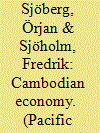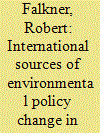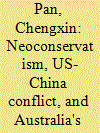|
|
|
Sort Order |
|
|
|
Items / Page
|
|
|
|
|
|
|
| Srl | Item |
| 1 |
ID:
076350


|
|
|
|
|
| Publication |
2006.
|
| Summary/Abstract |
Cambodia is facing the familiar problem of achieving sustained rates of economic growth that could help it alleviate widespread poverty. Against the background of some encouraging developments, and quite a few that are not equally reassuring, we argue that any push for development needs to consider both agriculture and industry. This is so as both labour absorption, primarily in secondary sector activities, and productivity growth in agriculture are necessary to lift large segments of the population out of the poverty associated with subsistence agriculture, landlessness and informal sector activities. Given that the major success story of the past decade - the garment and textile industry - is under threat, we conclude that Cambodia is yet to achieve an economic take-off.
|
|
|
|
|
|
|
|
|
|
|
|
|
|
|
|
| 2 |
ID:
076349


|
|
|
|
|
| Publication |
2006.
|
| Summary/Abstract |
For the general elections in 2000 and 2004, civic groups in South Korea joined forces to stage the so-called 'blacklisting campaign' or 'defeat campaign' against allegedly corrupt, incompetent or anti-reform politicians. The campaigns not only played a significant role in thwarting many politicians from getting nominated or elected but also heralded a new era in Korean politics: civic groups have now emerged as a major political force, capable not only of challenging party policies and pending legislation but also taking on an agenda-setting prominence in a wide array of policy areas. In analyzing the success of NGO political activities in the 2000 and 2004 general elections, this paper draws on resource mobilization theory to show how the civic groups effectively utilized various resources, including leadership skills, communications and office facilities, and access to the mass media, to achieve their objective rather than relying simply on the spontaneous participation of voters. In comparing the efforts of civic groups in the two elections, the paper also explains the factors that made their endeavors relatively less successful in 2004 (e.g. a splintering of alliances among the civic groups). On the whole, the paper argues that the greater political involvement by civic groups is likely to lead to a more pluralistic, open and competitive form of democracy, and that the vibrant civic activism in Korea is an indication not only of maturing democracy but also a more secure entrenchment of civil society.
|
|
|
|
|
|
|
|
|
|
|
|
|
|
|
|
| 3 |
ID:
076345


|
|
|
|
|
| Publication |
2006.
|
| Summary/Abstract |
Recent financial reforms in Japan and elsewhere in Asia represent, for various authors, a fundamental shift in financial governance and in state-business relations in the region. The old 'developmental' state in East Asia has supposedly made way for a neoliberal 'regulatory' state, with its emphases on agency independence and the non-discretionary enforcement of rules. I show in this paper that this interpretation exaggerates the extent of the transformation in the important case of Japan. Although the outward institutional forms of economic governance in Japan, as with many Asian developing countries, has changed dramatically since the mid-1990s, discretion still remains at the core of economic and financial policy. In the area of Japanese banking regulation and supervision, I show how this highly discretionary application and enforcement has been consistent with domestic political pressures. The result is a substantial divergence between superficial convergence upon international regulatory standards and underlying behaviour. I also give reasons why globalization does not mean that this hybrid regulatory model is unsustainable.
|
|
|
|
|
|
|
|
|
|
|
|
|
|
|
|
| 4 |
ID:
076348


|
|
|
|
|
| Publication |
2006.
|
| Summary/Abstract |
China's agricultural biotechnology policy has undergone a profound transformation over the last decade, from a strongly promotional to a more precautionary approach. From the 1980s onwards, China invested heavily in biotechnology development and in the early 1990s emerged as the leading biotech country in the developing world. In the late 1990s, however, it halted the authorization of new genetically modified crops and introduced stringent safety regulations. This paper investigates this policy shift and argues that international factors have played a central role. Two trends, in particular, are identified as key sources of the move towards greater precaution: China's ongoing international socialization, particularly in the context of the international scientific debate on biosafety and the negotiations on a biosafety treaty; and the growing globalization of agriculture and trade, which has exposed China to international competitive forces and trade restrictions in food trade. As the case of genetically modified food in China shows, political integration and economic globalization can work together to promote a strengthening of the domestic environmental policy agenda.
|
|
|
|
|
|
|
|
|
|
|
|
|
|
|
|
| 5 |
ID:
076346


|
|
|
|
|
| Publication |
2006.
|
| Summary/Abstract |
Following its time-honoured 'great and powerful friends' foreign policy tradition, Australia has been cultivating close ties simultaneously with the United States and China. Yet, as a rivalry between the two powers apparently looms large, Australia faces an acute dilemma. While the rise of China and the question of Taiwan are often cited as main causes of US-China discord, this article argues that the American neoconservative policy on China, underpinned by a belief in both military strength and moral clarity, is integral to this growing competition and is, by extension, partly responsible for the emergence of Australia's predicament. To avoid such a difficult choice, the article suggests that Australia should strive to curb the policy influence of neoconservatism both in the United States and at home by pursuing a more independent foreign policy, making clear its strategic postures on US-China relations, and helping establish a trilateral strategic forum between Australia, the United States, and China.
|
|
|
|
|
|
|
|
|
|
|
|
|
|
|
|
| 6 |
ID:
076347


|
|
|
|
|
| Publication |
2006.
|
| Summary/Abstract |
Despite global trends towards military reform characterized by processes of professionalization and democratization, militaries in Southeast Asia have continued to play prominent roles in domestic politics since 11 September. This suggests that wider patterns of global military reform have not had as great an impact on the control, capacity and cooperative functions of armed forces in Southeast Asia as they may have elsewhere. In order to explore why the security sector reform agenda has had so little impact in the region, we investigate recent patterns of civil-military relations in Southeast Asia by focusing on the experiences of four of the region's militaries: Malaysia, Thailand, the Philippines and Indonesia. We argue that the security sector reform agenda is informed by a predominantly North American approach to civil-military relations based on a number of core assumptions that do not reflect Southeast Asian experiences. Hence, we ask whether the reform agenda itself could be modified to better suit the Southeast Asian context. We suggest that although the regional military sector has not reformed along a 'Western' path it is nonetheless possible to see other types of, and potential for, reform.
|
|
|
|
|
|
|
|
|
|
|
|
|
|
|
|
|
|
|
|
|